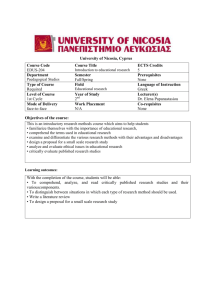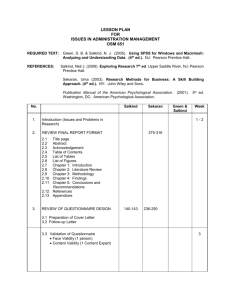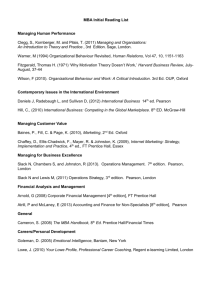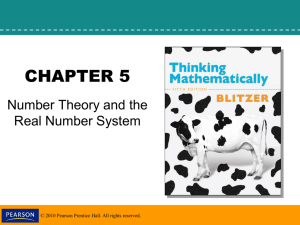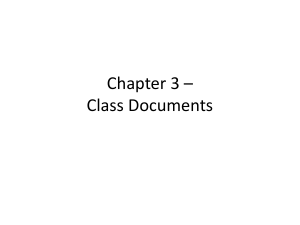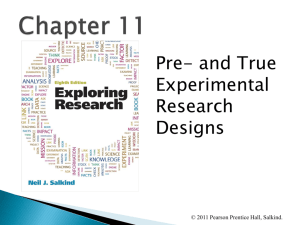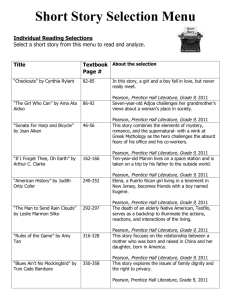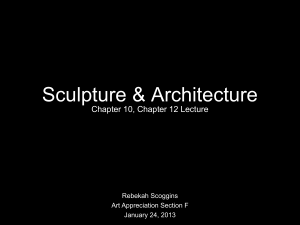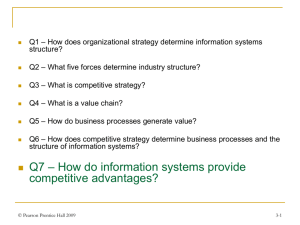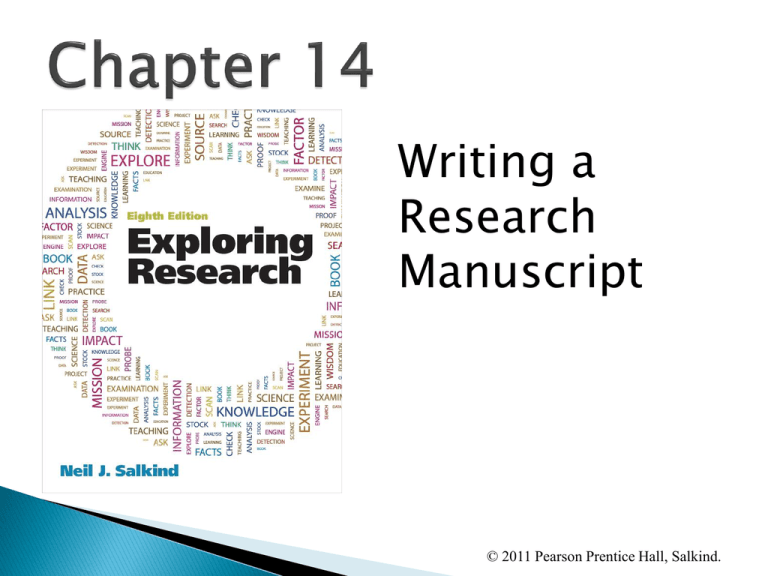
Writing a
Research
Manuscript
© 2011 Pearson Prentice Hall, Salkind.
Identify the essential components of a typical
manuscript and summarize the purpose of
each.
Discuss why the abstract is such an important
part of the manuscript.
List the basic “rules of thumb” for formatting
manuscripts using APA style.
© 2011 Pearson Prentice Hall, Salkind.
What a Manuscript Looks Like
Nuts and Bolts
© 2011 Pearson Prentice Hall, Salkind.
© 2011 Pearson Prentice Hall, Salkind.
Title Page
Abstract
Introduction
Method
Results
Discussion
References
Appendices
Author Note
Footnotes
Table Captions
Tables
Figure Captions
Figures
© 2011 Pearson Prentice Hall, Salkind.
Running Head
Title
Authors
Institutional
Affiliation
Guns and Chewing Gum
1
Running Head: GUNS AND CHEWING GUM
Guns and Chewing Gum: The Perception of Reality of
Problem Behaviors in Public Schools
Neil Salkind1, Douglas Adams, Craig Dermer, Jackie
Heinerikson, B. Jones and Erin Nash
University of Kansas
© 2011 Pearson Prentice Hall, Salkind.
A one-sentence statement of purpose
A brief description of participants
A brief description of results
Any conclusions being offered
© 2011 Pearson Prentice Hall, Salkind.
Running head
appears on each page
Guns and Chewing Gum
2
Abstract
No indent
In a 1994 New York Times article, Barry O’Neill traced the evolution of two lists
(one from the 1940s and one from the 1980s) of reportedly serious behaviors in
the public schools. He found the origins of the list…
© 2011 Pearson Prentice Hall, Salkind.
Outlines background of problem
Helps reader understand problem
States purpose of study
© 2011 Pearson Prentice Hall, Salkind.
Title
Level 1
heading
All text is
double spaced
Guns and Chewing Gum
3
Guns and Chewing Gum: The Perceptions and Reality of
Problem
Behaviors in Public Schools
In 1994, Barry O’Neill (O’Neill, 1994) wrote an article that
appeared in the Sunday Magazine section of the New York Times,
titled “The History of a Hoax.” The article traced the evolution of
two lists of the reportedly most serious behaviors in the public
schools, one list generated during the1940s and one list
generated during the 1980s.
1.5 inch margin
1.5 inch margin
© 2011 Pearson Prentice Hall, Salkind.
Describes how the study was conducted
The most common subheads are
◦ Participants—who they were and what special
characteristics they had; what instructions were
given
◦ Instruments—what tests, drugs, computers, etc.,
were used
◦ Data Analysis—how the data were analyzed
© 2011 Pearson Prentice Hall, Salkind.
Guns and Chewing Gum
5
Level 2
heading
rankings of the seriousness of a list of behaviors as a function of
whether or not the respondents currently teach in the public
schools.
Level 1
Method
heading
Participants
The sample consisted of predominantly middle class U.S.
Midwestern adults who ranged in age from 23 to 58 years with a
mean age of 37.2. There were 125 females and 25 males, with
113 of the total sample currently teaching and 36 not.
© 2011 Pearson Prentice Hall, Salkind.
Guns and Chewing Gum
5
Reference to
where table
1 should
be placed
The list of behaviors (organized alphabetically) is
shown in Table 1. This list was compiled based on
interviews with 30 adults, 15 of whom currently teach
in the public schools.
Insert Table 1 about here
© 2011 Pearson Prentice Hall, Salkind.
Descriptive statistics
Outcomes of inferential statistical tests
References to tables and figures
© 2011 Pearson Prentice Hall, Salkind.
Level 1
heading
Guns and Chewing Gum
6
Results and Discussion
Tables 2 and 3 represent the same data organized in
different ways. Table 2 shows the most serious
behaviors ranked by the sample of teachers and
nonteachers. Table 3 shows the 13 most serious
behaviors listed in alphabetical order and the associated
ranks and average “seriousness” score for the total
sample, teachers and nonteachers.
© 2011 Pearson Prentice Hall, Salkind.
Evaluation of study
◦ How this study relates to past studies
◦ What the results mean
Contributions the study makes
Implications and limitations
Results and discussion are sometimes
reported together in one section
© 2011 Pearson Prentice Hall, Salkind.
Sources consulted during course of study
Must be in appropriate format
© 2011 Pearson Prentice Hall, Salkind.
Level 1
heading
Book
reference
Journal
article
references
Magazine/
Periodical
reference
Guns and Chewing Gum
9
References
Berliner, D.C., & Biddle, B.J. (1996). The manufactured
crisis: Myths, fraud, and the attack on America’s public
schools. Boston. Addison-Wesley.
Gallup poll of public attitudes toward the public schools.
(1987) Phi Delta Kappan, 69, 28-29.
King-Stoops, J., & Meier, W. (1978). Teacher analysis of
the discipline problem. Phi Delta Kappan, 59, 354.
Males, M. (1992). Top school problems are myths. Phi
Delta Kappan, 72, 54-55.
O’Neill, B. (1994, March 6). The history of a hoax. New
York Times Magazine, 31, 15-21.
© 2011 Pearson Prentice Hall, Salkind.
Appendices
◦ Non-essential but important information
◦ Often original data or drawings
Author Notes
◦ Supplementary information
Footnotes
◦ Elaboration on references or other technical points
in manuscript
© 2011 Pearson Prentice Hall, Salkind.
Table Captions—a list of tables to follow and
their respective captions
Tables
◦ Text arranged in columns or rows
◦ Numbered consecutively
© 2011 Pearson Prentice Hall, Salkind.
Figure Captions—identify each of the figures
with a number and title
Figures
◦ Actual figures
© 2011 Pearson Prentice Hall, Salkind.
© 2011 Pearson Prentice Hall, Salkind.
Some important format rules:
Type should be readable
Use 12-point Times Roman or Courier type
Double-spaced
One-inch margins
Use appropriate page numbering
Indent first line of each paragraph 5-7 spaces
Type headings according to standards
One space after all punctuation
Do not indent the abstract
Start the list of references on a new page
© 2011 Pearson Prentice Hall, Salkind.
Identify the essential components of a typical
manuscript and summarize the purpose of
each?
Discuss why the abstract is such an important
part of the manuscript?
List the basic “rules of thumb” for formatting
manuscripts using APA style?
© 2011 Pearson Prentice Hall, Salkind.

